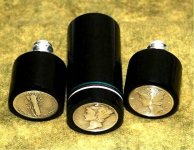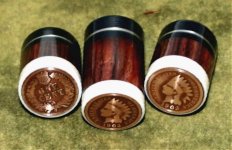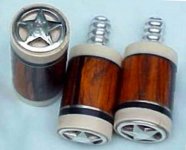Jim,
When you have an electronic calipers, how does one accurately measure the joint to determine the specific type. It's my understanding the first number in a joint refers to the thickness of the bolt thread and the second number refers to the number of threads contained within a one inch measurement. Does that sound correct to you?
So when you have a cue that has a piloted ivory joint, you might not be able to measure a one inch span on the thread since a portion of the threads is recessed beneath the cue joint's flat surface. As an example, my cue only has approx. 5/8-3/4" extending above its ivory collar but there are also threads beneath the ivory collar where the shaft collar gets seated. So in those situations, should you just count the threads within a 1/2" span and then double the count so it's equivalent to what a 1" span should measure at?
There seems to be a really broad array in different cue joint sizes, and, I do appreciate that the majority of cue-makers typically use(d)only a few different types of cue joints. Thanks for any feedback you can provide.
Matt


